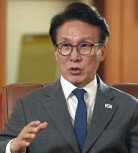Real estate recovery expected under new Land Minister
Real estate recovery expected under new Land Minister
Posted February. 19, 2013 06:37,
The nomination as land and transportation minister of Suh Seung-hwan, who is widely considered a pro-market economist, has led to growing expectations of a rebound in the stagnant real estate market.
An economics professor at Yonsei University in Seoul, Suh is a member of the second economic subcommittee of the presidential transition committee. With his steadfast opposition of government intervention in the real estate market, a growing number of analysts say regulations that were introduced amid an overheating market will be eased to a significant extent.
Suh blamed lack of housing supply rather than speculative demand for the overheating of the real estate market under the Roh Moo-hyun administration. He also blasted the Roh government for taking a flurry of regulatory measures, including levying the comprehensive real estate tax and heavier transfer tax on owners of multiple homes to suppress housing prices. They only distort the market, Suh said at that time, adding that such policies blindly pursued egalitarianism as formality.
He strongly criticized the comprehensive real estate tax. In a 2007 forum, he said, It`s not normal for taxpayers to have to sell their homes because they have no money to pay taxes. I`m not sure if this complies with the Korean Constitution, which pursues a market economy system. Suh called the comprehensive real estate tax ill-advised, suggesting that it be combined with the property tax.
The Land and Maritime Affairs Ministry, which will be replaced by the Land and Transportation Ministry, also said, We will consult with related ministries to convert the comprehensive real estate tax into the property tax. So chances are high that tax systems related to real estate will be significantly amended.
Under the outgoing Lee Myung-bak administration, Suh has been outspoken in his pro-market beliefs. In an opinion piece in 2008, he said, Korea should introduce the principle of supply and demand for real estate as well. Efficiency is more important than equity.
As for the state-subsidized housing program for the working-class, he said, By causing home buyers to grow reluctant to purchase homes, the program boosts demand for jeonse (a rental system based on a lump sum security deposit), adding that such housing should be converted into public rental homes. Therefore, the incoming government is expected to significantly reduce the supply of state-subsidized homes or even abolish the program.
As for jeonse and monthly rental homes, Suh also proposed the expansion of public rental home supply rather than capping the price for such homes as the fundamental solution. He devised a jeonse system based on a smaller lump sum security deposit and a Happy 200,000 Housing Units project for building rental homes on deserted railways, which were President-elect Parks election pledges. Analysts say he will seek a two-track strategy of boosting housing welfare for the working class through market deregulation.
Since Suh basically opposes state intervention in the market, however, he is unlikely to suggest policies meant to galvanize the market and shore up housing prices. With heavy household debt considered a serious problem, the new government has little chance to introduce measures on drastic deregulation. He once said, If housing prices increase, this could lead to significant expansion of household debts and cause a serious problem in financial stability.
He used to say that to prevent housing prices from falling father, the government should the new home price ceiling system and a heavier transfer tax on owners of multiple homes. Since related bills have repeatedly failed to clear the National Assembly, however, how he will tackle this issue is gaining attention.
imsoo@donga.com





![[천광암 칼럼]장동혁은 대체 왜 이럴까](https://dimg.donga.com/c/138/175/90/1/wps/NEWS/IMAGE/2026/02/22/133399127.1.jpg)

